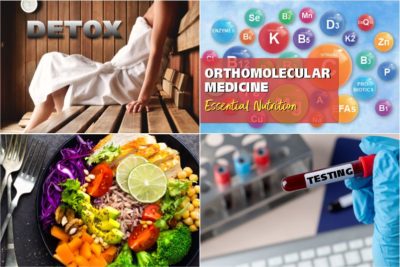Nutrition, Exercise and Sunshine!
Other clinical studies found that 94% of 290 patients enrolled in psychiatric care in both inpatient and outpatient settings had nutritional deficiencies, as well as low sun exposure and lack of exercise.4,5 Based on this and much additional scientific evidence, improving nutritional and lifestyle factors are indicated as highly effective and safe strategies for Viibryd alternatives.
Despite the hopefulness that may have accompanied the wave upon wave of antidepressant drugs to treat depression over the last 7 or 8 decades, many have found drug treatment was ineffective at best, and for others, may have caused considerable worsening of their condition. We have observed that ignoring root causes in many cases completely negates the chance of actual recovery from unwanted mental health symptoms. But the opposite is equally true, providing an authentic opportunity for achieving one’s health goals.
More information is presented below about a wide range of exciting Viibryd alternatives that are used at Alternative to Meds Center to discover and treat the root causes and contributing factors associated with depression and other undesirable symptoms.
What is Viibryd (vilazodone)?
Viibryd is referred to in the medical literature as a “novel” antidepressant that was FDA approved in 2011.1 FDA approval was gained for the treatment of MDD (major depressive disorder) although many off-label uses have also developed. According to the drug’s label, the mechanics of how Viibryd works is not completely known but is theorized to selectively affect serotonergic receptors, though how it does this is described as unknown. Like all SSRI drugs, Viibryd is marketed as a drug that will counteract “low serotonin in the brain,” though it is often overlooked that no drug can create serotonin or any other hormone. Only the human body can do that, and only if the proper raw materials are provided to do so. Viibryd alternatives, in contrast, allow potentially more effective drug-free solutions including targeted nutrition, as one example. More examples follow below.
Holistic Viibryd Alternatives and Their Benefits in Treatment
At the Alternative to Meds Center, holistic Viibryd alternatives are used in several specific ways. Before tapering from medication, a personalized program of alternative therapies and other support actions is begun in order for the person to stabilize sufficiently and be well-prepared for their gentle tapering to begin. Additionally, during the tapering process, natural aids and therapies are provided to significantly reduce and even eliminate the symptoms associated with coming off medication. Once tapering is complete, additional alternatives to Viibryd are prescribed as needed to continue to support natural mental health without relying on medication. The following lists some examples of Viibryd alternatives to medication that have been documented in clinical studies to be highly effective at treating (resolving) symptoms of depression, and that are used at Alternative to Meds Center:
- Lab testing at Alternative to Meds Center is used in designing the client’s most effective alternative Viibryd treatment plan and provides a solid foundation for formulating effective, personalized treatment solutions. Nutritional deficiencies are commonly associated with physical ailments — think 16th-century sailors — lack of vitamin C, and scurvy. However, the relationship between Omega-3 fatty acids and depression, though well-documented, is perhaps less widely known, or used therapeutically.5,6,9
- Neurotransmitter rehabilitation: Orthomolecular medicine and environmental medicine are used at the center to provide the body with the correct raw materials that are food-sourced. Also noted for efficacy are nebulized glutathione, and a wide range of oral and IV supplementation to encourage neurotransmitter rehabilitation naturally.7
- Restoring a healthy gut is vital: the dysfunctional microbiome is another often overlooked barrier to recovery from depression and can be addressed with diet and supplementation and other therapies.15
- Orthomolecular medicine also includes the judicious and strategic use of correct diet and supplements which are proven to be helpful for unwanted symptoms.11 Some examples include correcting magnesium deficiency, supplementation with passionflower extract, vitamin C, vitamin E, zinc, Omega-e fatty acids, lavender, saffron, black cohosh, and many others that have been clinically documented to have a favorable risk/benefit ratio compared to medication-based treatments.8-10
- Gentle medication tapering under medical supervision, in coordination with and supported by Viibryd alternative therapies to ease the process.
- Neurotoxin removal: safely flushing out toxins, heavy metals, pesticides, other chemical residues, etc., that tend to store in the fatty tissues of the body. Using chelation, sauna, colon hydrotherapy, holistic detox, and other deep-cleansing methods the results are often nearly immediate including better sleep, more energy, feeling brighter, lighter, and younger, with a notable positive shift in mood.
- Counseling services: CBT18 or cognitive-behavioral counseling, dialectical behavioral therapy, mindfulness therapy, peer support programs, equine-assisted therapy, and art therapy, are a few examples of the many counseling services available at the center to support holistic detox and recovery.
- Physical therapies such as yoga, Qi Gong, exercise, holistic pain management techniques, therapeutic massage, and other spa services are used for their beneficial results during Viibryd tapering and recovery programs.
Information on Diagnosing Depression from DSM-5
Alternative to Meds Center does not focus on labels. And we know we live in a world that has its fair share of imperfections. As sentient beings, we react and respond to these impinging factors in unique ways as individuals, take them on, and struggle with them as best we can. Sometimes our mental health takes the brunt. We may not have had the clarity of mind or even the correct information to know what to do before things got out of control healthwise. Sometimes we are ruggedly resilient and sometimes we opt to ask for help.
For many, there has been a strong encouragement from many quarters to apply a label, and only seek help in the form of antidepressant drugs, which technically has to be justified with a diagnosis. To hang a label of “depression” on a patient, there are a number of quite complex criteria to inform prescribers on how to label such patients that come to them for help. While we do not focus on these, we believe it is helpful to understand the criteria behind them. These criteria are highly complex! And, are not usually discussed in a brief 5 or 10-minute visit to the doctor. Anyone can find them listed in the 5th version of the DSM.12 For brevity, and quick study, here is a summary:
- One of 2 major components for a diagnosis of depression must be: a depressed mood, or anhedonia (the inability to feel pleasure) and one or both of these symptoms must last most of the day, every day, for at least 2 weeks in a row.
- Four or more of the following:
- Unintentional weight loss or weight gain of 5% or more in a month, or for children, failure to increase weight gains as expected each month.
- Sleep disturbance (insomnia — lack of sleep, or hypersomnia — excessive daytime sleepiness, and /or prolonged nocturnal sleep.)
- Psychomotor changes: agitation or retardation severe enough to be observable by others.
- Tiredness, fatigue, and low energy make it difficult to complete normal tasks.
- A sense of worthlessness, and/or excessive, inappropriate, or delusional guilt.
- Difficulty thinking clearly, inability to make decisions, lack of concentration.
- Suicidal ideation, recurrent thoughts of death, (not just fear of death).
However, there are also conditions that must be met for the label to be justified. These include:
- The symptoms are not associated with substance abuse.
- The symptoms are not associated with a medical condition.
- The symptoms are not associated with prescription medication side effects.
A careful observer might note that establishing the entire set of criteria correctly would take quite a bit longer than a 10-minute visit to the doctor. These conditional requirements also reveal that the DSM-5 has dropped the “bereavement” category which would have formerly exempted a diagnosis of depression after, for example, losing a spouse. With the change in criteria on this point, anyone who loses a loved one or suffers some other significant loss could now be technically “labeled” with a diagnosis of depression.
Now the door swings wide open to drug treatment or other invasive procedures and potentially bypasses other treatments that could address and resolve and relieve the depressed state more appropriately. You might wonder, as we have after interviewing many of our clients who come to us for help, how much of the above information are prescribers truly familiar with? And even if they are, how can these criteria be accurately assessed in a quick visit before pulling out a prescription pad?
Are Some Antidepressants Better Than Others?
Antidepressants have been around since the turn of the century. Since their entrance in the 1950s, an almost continuous flood of new antidepressant drugs has come about, including tricyclics, tetracyclines, monoamine oxidase inhibitors, glutamates, re-purposed tuberculosis drugs, the SSRIs and SNRIs, the atypical antidepressants, experimental hallucinogenics, and others. Yet for all that the pharmaceutical industry has to offer, the statistics from the WHO show that depression is currently the leading cause of disability in the entire world, and a major contributor to the global burden of disease globally. Clearly, the drug treatment model has not succeeded.3,13
Antidepressant drugs are considered the first-line treatment and rarely is anything resembling Viibryd alternatives ever employed. Typically, 50-75% of patients do not feel they get an adequate response with the first antidepressant prescribed. So another one and possibly other medications will be prescribed, frequently with similar disappointing outcomes. When none of the selected drugs seem to help, the patient’s diagnosis is often changed to “treatment resistive depression,” which some may feel is a rather punitive term and may cause a patient to begin to feel they are a “hopeless case” Doctors may also begin to frantically search for “better” (stronger) drugs, and even electroconvulsive therapy in desperation to get a result “at any cost.”14
In addition to the lack of tangible results in a large percentage of patients, another troubling outcome of antidepressant drug therapy is the intensity of adverse effects that are caused by the treatment itself. This is a common reason people discontinue or would discontinue drug-based treatment if they could tolerate the withdrawals.
Therefore, it is really difficult to say one antidepressant is better than another when results are hit or miss, even when the patient follows instructions correctly. What we have observed at the center is that typically no efforts were ever made to search for contributing factors that could be responsible for the patient’s persisting depressed condition. It is not that doctors are uncaring. This trend of over-prescribing stems from time pressures as well as a glaring lack of education and familiarity with non-pharmacological options like Viibryd alternatives.
Natural Viibryd alternatives and non-pharmacological treatments are our specialties at Alternative to Meds Center, and why our clients’ successes are so life-changing.
Viibryd Alternatives at Alternative to Meds Center
We are passionate about the programs we deliver at the center. If holistic, medically monitored treatment sounds like a good fit for you or your loved one, please contact us for more information. Our accredited inpatient services are available at our pristine facility, staffed by over 40 medical professionals who are ready to help you attain your health goals with understanding and compassion, and with effective tools.
Insurance coverage is available from most major carriers and we can help you gather the information you need to make an informed decision. Please feel free to ask about the Viibryd alternatives programs we offer, research the services offered here, and we will be happy to take the time to speak with you or your loved one to provide any other information on the program and results that you are interested in.

 CBT, other forms of counseling 18
CBT, other forms of counseling 18







